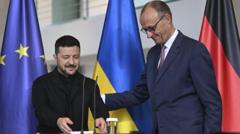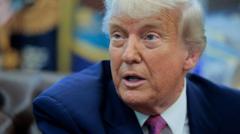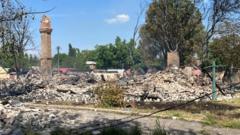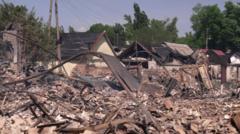Friedrich Merz's government aims to enhance military support for Ukraine amidst ongoing tensions with Russia while diplomatic discussions continue.
Germany Commits to Support Ukraine in Producing Long-Range Missiles

Germany Commits to Support Ukraine in Producing Long-Range Missiles
Germany's new Chancellor Friedrich Merz announces plans to aid Ukraine in missile production during a meeting with President Zelensky in Berlin.
Germany's Chancellor, Friedrich Merz, has pledged to assist Ukraine in producing long-range missiles to bolster its defence against Russian aggression. Meeting with Ukraine's President Volodymyr Zelensky in Berlin, Merz indicated that the German government is ready to engage in discussions concerning the missile production, although he refrained from mentioning specific armaments like the Taurus missile—capable of reaching targets up to 500 km away.
Since taking office earlier this month, Merz's administration has advocated for increased support for Ukraine, asserting that limitations on the range of weapons supplied by Western nations have been lifted. A formal "memorandum of understanding" pertaining to long-range missile collaboration is anticipated to be signed between the German and Ukrainian defence ministers.
While the Kremlin has voiced concerns about the implications of providing more advanced weaponry to Ukraine, Merz clarified that the decision to remove range restrictions was previously established by Western allies. Earlier this week, Zelensky suggested that future negotiations should include not only himself but also significant leaders from the U.S. and Russia—implying a direct role of past U.S. President Donald Trump in peace discussions.
Despite ongoing dialogues, Zelensky has accused Russia of stalling the peace process and called for increased sanctions from Washington targeting Russian banks and energy sectors. Trump echoed these concerns, cautioning against Russia's failure to advance in negotiations, especially following recent violent incidents resulting in Ukrainian casualties from missile strikes.
On the battlefield, Ukraine has reported a significant uptick in drone operations against Russian targets, with consistent attacks being met by heightened Russian military activity, particularly along the eastern front. Reports indicate that approximately 50,000 Russian troops are being amassed, with the potential to escalate confrontations as Russia seeks to establish territorial buffer zones following their annexation of Crimea in 2014.
As the conflict enters its fourth year, with a substantial loss of life and considerable destruction, both leaders loom over a future marked by urgent calls for resolution, with diplomatic tensions remaining high amidst aggressive military strategies.
Since taking office earlier this month, Merz's administration has advocated for increased support for Ukraine, asserting that limitations on the range of weapons supplied by Western nations have been lifted. A formal "memorandum of understanding" pertaining to long-range missile collaboration is anticipated to be signed between the German and Ukrainian defence ministers.
While the Kremlin has voiced concerns about the implications of providing more advanced weaponry to Ukraine, Merz clarified that the decision to remove range restrictions was previously established by Western allies. Earlier this week, Zelensky suggested that future negotiations should include not only himself but also significant leaders from the U.S. and Russia—implying a direct role of past U.S. President Donald Trump in peace discussions.
Despite ongoing dialogues, Zelensky has accused Russia of stalling the peace process and called for increased sanctions from Washington targeting Russian banks and energy sectors. Trump echoed these concerns, cautioning against Russia's failure to advance in negotiations, especially following recent violent incidents resulting in Ukrainian casualties from missile strikes.
On the battlefield, Ukraine has reported a significant uptick in drone operations against Russian targets, with consistent attacks being met by heightened Russian military activity, particularly along the eastern front. Reports indicate that approximately 50,000 Russian troops are being amassed, with the potential to escalate confrontations as Russia seeks to establish territorial buffer zones following their annexation of Crimea in 2014.
As the conflict enters its fourth year, with a substantial loss of life and considerable destruction, both leaders loom over a future marked by urgent calls for resolution, with diplomatic tensions remaining high amidst aggressive military strategies.




















